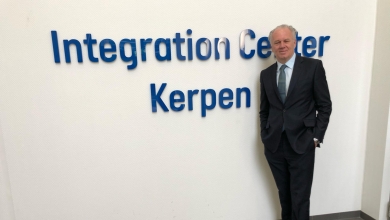
MarkLogic is an enterprise database that seems to be winning a lot of accolades – not least at the ITE European IT and Software Excellence Awards this month, where it picked up top Data, Information or Management or Analytics Solution of the Year in the ISV/app section. This was for its work with a European customer. And it seems to be in Europe, with the EU and GDPR driving compliance and regulatory control of data, that the story gets really interesting.
IT Europa spoke to Joe Pasqua (pictured), EVP of Products, whose own history includes working on the rise of the more traditional relational databases at Oracle. Why is MarkLogic’s model now doing better than these older sorts of databases? It looks like a mixture of flexibility in database design, ease of use in the cloud, and an obvious advantage in security and compliance, and Joe Pasqua thinks it might be all of these.
“What we are doing now is going through a major shift in the way people use their data and get value from it. The traditional database market is sticking with their knitting, using the models they have always used. But there is a new generation of database technologies that are taking a fundamentally different approach. What is interesting to me is why that new approach is needed. Data was previously managed in a structured way – tables and rows with strict definitions. It was very rigid and fixed; it meant that anyone building a database service started by building a fixed structure. This results in many different data silos and islands which are not interoperable and flexible.”
The analogy he uses is that you can build anything from cement – it can be moulded while liquid. But once set, it is hard to change. And this, in a database, does not match the pace of change in the modern enterprise. So the MarkLogic database does not rely on a pre-declared structure. The underlying structure is discovered by the database itself, he says. “We look inside the data and work on that, without any declared structure. It is fundamentally different”.
Systems like MarkLogic, which use this approach, can change structures just as easily as changing the data, he says.
“The best analogy is that MarkLogic is much more like Google than Oracle. Google can index any web page regardless of page structure; MarkLogic can look at data in the same way with both structure and data. It makes it a lot easier to work with unstructured data as well; particularly useful in areas such as medical records with lots of unstructured information such as notes.”
“It makes analytics easier for users, but harder for the database guys, but that is the way we like it. Users have a wider set of data, we work to make it possible to give them the power. We are living in a world of big data and we need to be able to search a wide variety of data and relationships. The really interesting piece is when you add the search and query aspect to the analytics in MarkLogic, it becomes much more manageable.”
It even wins against distributed databases like Hadoop which rely on power to analyse large data sets, where MarkLogic will work only with a subset of filtered results, he says.
How does it deliver results to customers? It has direct sales as well as integrator and consulting partners. Large enterprises have pre-existing relationships with the experts who help them with implementation, and MarkLogic is finding useful business coming through that channel, he says.
But the market looks set to grow even wider: the European market is of particular interest because of the regulatory perspective and protection of information. “We see a lot happening in the European market and then moving globally. That is critical from a data perspective. There is more regulation today that requires access to data that is in no single system. It poses a real challenge and is having a real impact in large organisations, where they need to show compliance and reporting.
“We believe we can scale to meet this demand – there are many more regulated markets than previously. The opportunity is very large and from a product perspective we are integrating more of the technologies that do this into the foundations of what we do. It means we are very different from the rest of the database market; we think the provisioning and governance of the data should be part of the database system.”
Governance and security go hand in hand and these are the current major investment areas for the company. And, of course, they are intimately tied to cloud adoption. Users want to know that their data will be secure in the cloud, or anywhere. “We want more people to be comfortable with their data in the cloud. There will be a big push for us this year on cloud and higher-level solutions, to make it easier to integrate data from all the silos. For example, all the operational expertise is now being provided as a service on AWS – a customer looking for a simplified approach on data can go to AWS and in fifteen minutes they will have a fully secure and government data hub on AWS operated by MarkLogic. We’ve taken all the infrastructure and hardware out of the equation. We think there is going to be a big shift in the way people use the technology.”


